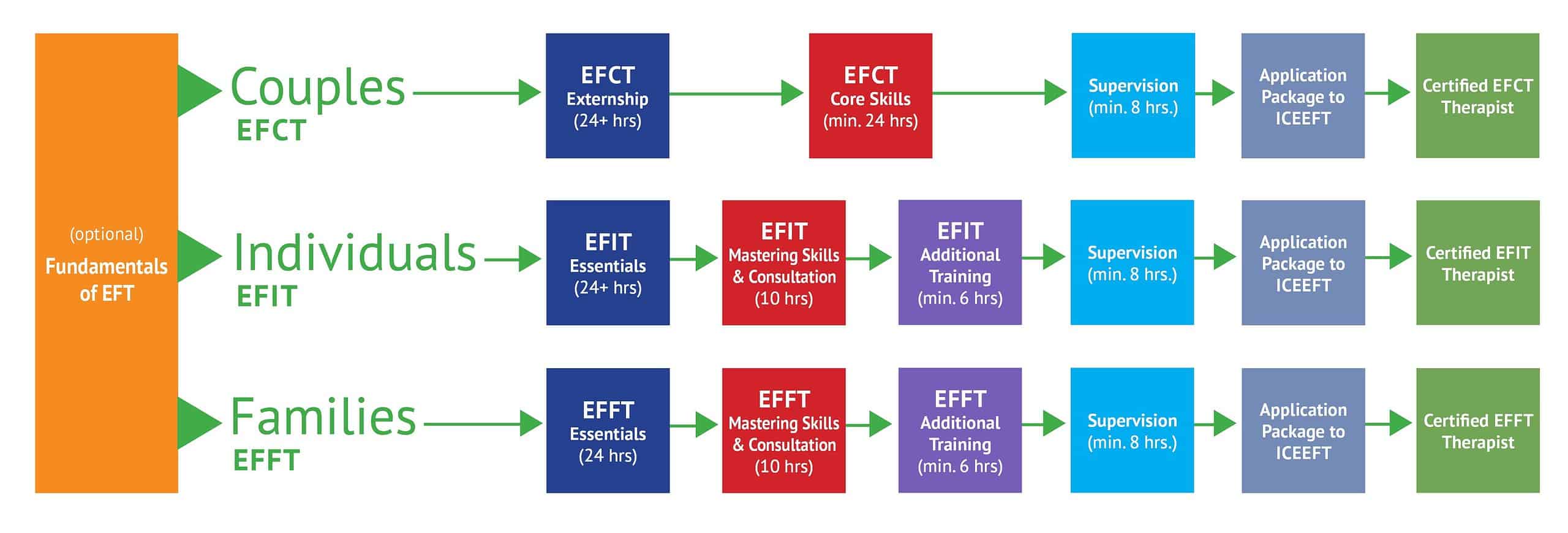Path to ICEEFT Therapist Certification in EFT
General Overview
As of January 2024, ICEEFT offers therapist certification in three modalities: EFCT (EFT for Couples), EFIT (EFT for Individuals), and EFFT (EFT for Families). Below is a general overview of the requirements and steps to become certified in each modality.

More detailed information about how to certify in each modality is available on their overview pages:
Overview of the EFT Therapist Certification Process
Detailed information about trainings, certification requirements and processes, and much more are available on the members’ website.
1. Membership at ICEEFT
To begin the certification process, you must be a current member of ICEEFT. Membership provides access to essential certification resources and information, your member profile, and the application checklist.
2. Certification Review Fee
The ICEEFT application review and administration fee is CAD $600.
Discounted rates available for applicants from countries outside North America based on Gross National Income (GNI):
- $400 CAD for GNI between $20,000–$30,000
- $200 CAD for GNI under $20,000.
4. Complete Clinical Supervision
Complete the required supervision hours for the modality or modalities you are applying for certification in. You can find an EFT Supervisor offering online or in person supervision through ICEEFT’s public directory.
5. Supervisor Review and Video Selection
Applicant and Supervisor work together to verify professional requirements and choose and finalize video submission. ICEEFT members can access detailed information about review and video selection on the members’ site. To review the professional requirements, please see the checklist below.
6. Send Application Package to ICEEFT
Once everything is ready, your completed certification package is submitted to ICEEFT for review. Be sure to review the certification pages on the members’ site before submitting your application. Each modality (EFCT, EFIT, and EFFT) has its own detailed certification page available to ICEEFT members.
General Overview of Skills Required for EFT Certification
Learning and integrating the EFT model includes developing the following skills. This list can be used as a guideline to assist applicants and supervisors to assess for readiness for certification. Additional specific details and information for certification in each EFT modality (EFIT, EFCT & EFFT) are available on the ICEEFT members website.
Therapist readily demonstrates…
- Effectively engaging with clients in all their diversity, including the negative impact of discrimination along with clients’ strengths and resilience.
- Attunement and empathic tracking of client’s experience.
- A safe-haven alliance (A.R.E.) including assessing risk, context, and contraindications.
- A focus on reactive patterns and validating client’s attachment strategies.
Therapist shows ability to…
- Reflect and validate client’s experience and identify emotions and relational patterns.
- Validate vulnerabilities and coping strategies, normalizing blocks.
- Ask evocative open-ended questions that help identify patterns and elicit deeper emotions and underlying attachment fears and longings, encouraging self-reflection.
- Make appropriate empathic conjectures that validate and deepen experience (e.g. self/other).
- Use all micro skills together with RISSSSC prosody – slow, specific, soft, etc.
- Heighten experience with images and client’s emotional handles, where appropriate.
- Reframe experience – mostly in terms of attachment-related emotions.
- Evoke emotional experience and choreograph engaged encounters/enactments.
- Pace risk-taking appropriately, holding client within the leading edge (e.g. window of tolerance).
Therapist shows ability to…
- Move 1: Identify relational patterns and affect regulation processes leading to self-perpetuating cycles.
- Move 2: Assemble Emotion – Pinpoints trigger, perception, body sensation, meaning and action tendency by focusing on and processing core emotions.
- Move 2: Distill emotion with RISSSSC and engages present experience in highly focused manner.
- Move 3: Set up encounters/enactments that prompt new awareness and /or bonding experience.
- Move 4: Process encounters (from Move 3) with client(s).
- Move 5: Summarize progress in the session, validating growth and contrasting new interactions with previous patterns.


